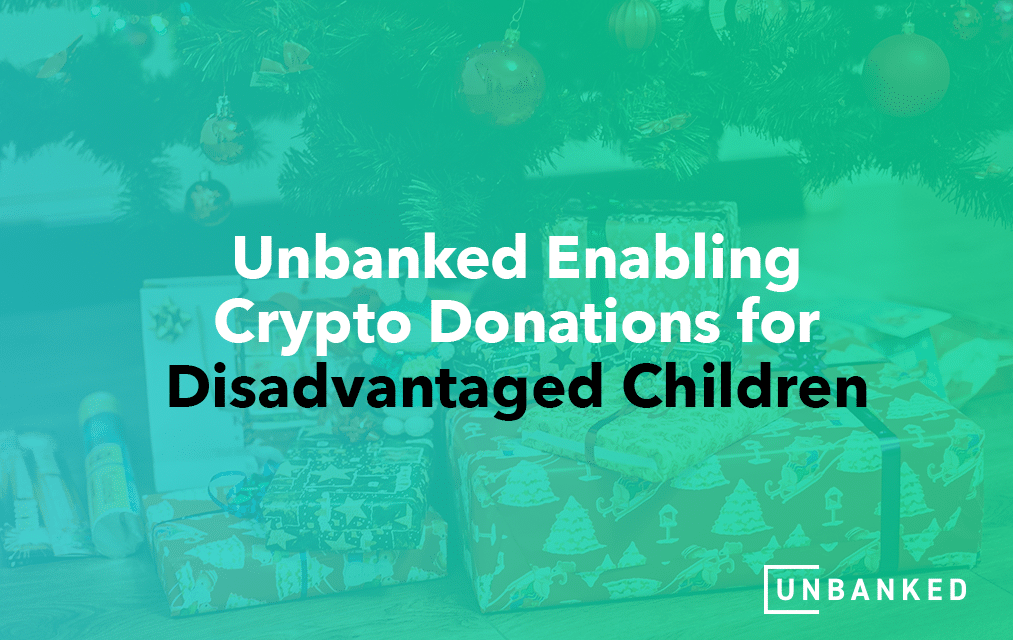Last month, Unbanked, a global financial institution that provides transformative products using blockchain infrastructure, partnered with Toys For Tots, a United States Marine Corps annual program that collects toys and distributes them to disadvantaged children. Until now, the Toys for Tots program has distributed over 604 million toys to 272 million unprivileged children all across the United States, Puerto Rico, and US Virgin Islands.
The partnership allows people to donate for these children in 28 different cryptocurrencies, including Bitcoin, Ether, Litecoin, and many more. Crypto Payments Profile, a new feature added by Unbanked, would work alongside crypto debit cards and global bank accounts to facilitate donations for the program. To donate, people simply need to go to the Toys for Tots Crypto profile, select the type of cryptocurrency they want to pay, scan the wallet code or copy the payment address into their custodial wallet. The transaction will be completed in a matter of seconds. Ian Shane, Co-CEO of Unbanked, highlighted the numerous benefits of digital assets and blockchain technology. Since the crypto market has been bullish this year for most people, Shane believes that the holiday season is the best time to pay it forward and help the disadvantaged.
The Marine Corps Toys For Tots Foundation is committed to fulfilling the Christmas (holiday) dreams for children who are not privileged enough to receive toys. Its partnership with Unbanked will help them provide a “Christmas morning” experience that every child deserves. As the prices of cryptocurrencies witnessed a massive surge last year, crypto owners are interested in giving back to people. This is a huge opportunity for charities and other non-profit organizations to embrace cryptocurrency and reap its benefits.
Crypto Donations on the Rise
Cryptocurrencies can be a powerful tool for nonprofits and charitable ventures. Cryptocurrency can enable more transparent, secure, cost-effective, and faster donations. If any, with lower processing fees, the not-for-profit ultimately receives more money in hand. One of the advantages of donating in cryptocurrencies is anonymity. This is an excellent way of donating for philanthropists who want to remain anonymous. Further, crypto donations can be facilitated from any part of the world, i.e., nonprofits can receive donations from international donors and would not have to pay high exchange fees and go through complex processes.
Bitcoin reached an all-time high and hit almost $69,000 for the first time. Last year, the market capitalization of cryptocurrencies crossed the $3 trillion mark. With such record-breaking highs, crypto investors are more enthusiastic to give back to society. According to a recent survey by Pew Research Center, around 16% of Americans have been engaged in crypto-related activities (trading, investing, etc.). Millennials are particularly interested in cryptocurrencies. There are several projects, charities, and organizations that represent the philanthropic endeavors of crypto users and owners. For example, the American Red Cross and Save the Children have set up effective mechanisms to allow people to donate in cryptocurrencies. In 2020, Action Against Hunger, a global humanitarian organization, started accepting donations in cryptocurrencies. Since then, it registered a gain of $1 million through digital currencies. Some charities that facilitate crypto donations have witnessed a five-fold increase between 2020 and 2021. Some recent data might indicate that crypto investors and owners are more generous than other investors. This might be because crypto investors are primarily young, idealistic and they probably made substantial capital gains for the first time, which drives them to give back to others.
A Fidelity Charitable Trust study suggests that around half of cryptocurrency owners gave $1,000 or more to charity compared to one-third of all investors. Nearly 48% of millennials have some knowledge about cryptocurrencies compared to 18% of all investors. Interestingly, millennials are also a charitable generation. Research shows that nine in ten millennials consider charity an essential part of their life. Now, millennials interested in cryptocurrency and charity are donating more to non-profit ventures and other organizations. This means cryptocurrencies can become a precious source of charitable funding. In 2021, crypto owners and investors donated over $158 million worth of cryptocurrency, which is a 464% increase compared to 2020. Similarly, the Giving Block, a platform that facilitates crypto donations and raises funds for nonprofits, saw a rise of a swooping 583% in virtual asset donations in 2021. In just one day of its Crypto Giving Campaign, the company raised $2.4 million worth of cryptocurrencies as donations to over 1,000 nonprofits involved in the campaign.
Crypto Donations and Tax Implications
Although crypto donors do not donate to get tax relief, they must consider certain things before donating to charities. American taxpayers can avoid the capital gains tax and claim full donations if they donate cryptocurrencies directly to the charity or nonprofit. If you sell your cryptocurrency, say Bitcoin, for cash, you will be obliged to pay capital gains tax depending upon how long you have held the Bitcoin. If you hold the cryptocurrency for a long term (more than a year), then long-term capital tax rates of 0%, 15%, or 20% may apply, based on your income. And if you hold cryptocurrency for less, you have to pay short-term capital gains tax rates ranging between 10% to 37%, depending on your income.
American taxpayers can claim a deduction in their taxes based on the amount they donated if they itemize their deductions. These deductions range from 20% to 60% of adjusted gross income. It also depends on the kind of donation and type of charity organization. People who do not itemize their donations can still claim deductions up to $600 under the Taxpayer Certainty and Disaster Relief Act of 2020. However, the charitable donation is limited to 30% of your income.
At Unbanked, we genuinely believe cryptocurrencies to be vehicles for financial freedom and control. If you are interested in learning more about donating your cryptocurrencies, read our blog.





